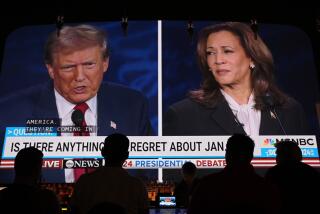Election rule clarified on public cash
WASHINGTON — The Federal Election Commission said Thursday that presidential candidates may accept private contributions for potential general election campaigns and still remain eligible for public financing if they ultimately win their party’s nomination.
The ruling came after a request for clarification from Sen. Barack Obama (D-Ill.), who has suggested he would like the option of running a publicly financed general election campaign -- with its associated spending limits -- if he could convince a future Republican opponent to do the same.
Some political observers, however, said the ruling was probably a moot point since a financial truce is highly unlikely in an era where political advertising, organization and travel are extremely expensive and both parties will be ferociously fighting for a White House with no incumbent.
The decision, in a 5-0 vote, comes as front-runners from both parties have eschewed public funds and spending limits for the primaries.
Obama had requested the ruling, stating that two of his top rivals for the Democratic nomination, Sen. Hillary Rodham Clinton (D-N.Y.) and former Sen. John Edwards (D-N.C.), had indicated they would probably reject the public financing system that has governed presidential elections for more than three decades.
The system, started in the wake of the Watergate scandal, gives presidential candidates money for campaign expenses, if they agree to certain spending limits. In 2008, the allocation is expected to be about $80 million, a small portion of what observers suspect each candidate will actually spend.
Members of the commission said the ruling could help preserve the public financing system.
“We all know the public financing system rests on a very fragile base,” said Commissioner Hans A. von Spakovsky.
Commissioner Ellen Weintraub said it was important to be flexible on the issue.
“It would be wrong for the agency to stand on a wooden interpretation of its regulations and of the statute while the public financing system crashes and burns,” she said.
The commission said Obama could solicit and receive contributions for the general election if he met certain conditions, including that the money be kept in a separate escrow account and that the funds not go for anything but general election activities.
If Obama were to win the Democratic nomination and then decide to accept public funding for the general election, he would also need to refund all general election contributions within 60 days of certifying his eligibility for public funds.
“Sen. Obama is pleased the FEC took this important step in preserving the public financing system,” Obama spokesman Bill Burton said. “If Sen. Obama is the nominee, he will aggressively pursue an agreement with the Republican nominee to preserve a publicly financed general election.”
The decision also was greeted favorably by Sen. John McCain’s campaign.
“The McCain campaign will now begin the process of accepting these general election funds, following the new FEC guidelines,” said Terry Nelson, campaign manager for the Arizona Republican. “Should John McCain win the Republican nomination, we will agree to accept public financing in the general election if the Democratic nominee agrees to do the same.”
Clinton’s campaign is considering a change in its position after the FEC ruling, spokesman Phil Singer said. The Edwards campaign didn’t have an immediate comment.
Rudolph W. Giuliani, the former Republican mayor of New York, hasn’t made a decision on federal financing yet, though he is raising money for the general campaign, said spokeswoman Maria Comella. Kevin Madden, a spokesman for Republican former Massachusetts Gov. Mitt Romney, said his focus “remains on the primary” though the ruling “expands the universe of available financing options.”
Taxpayers contribute to the public finance system by selecting whether to direct $3 of their tax liability to the presidential fund in their tax returns. Legislation pending in Congress seeks to retain the public financing system by increasing the amount taxpayers can set aside and by removing spending restrictions for primary candidates who accept the public money.
The Associated Press contributed to this report.
More to Read
Sign up for Essential California
The most important California stories and recommendations in your inbox every morning.
You may occasionally receive promotional content from the Los Angeles Times.










